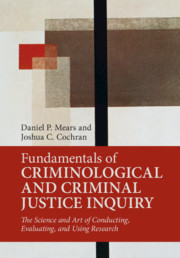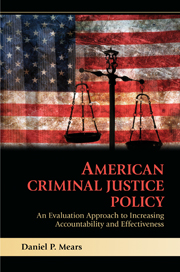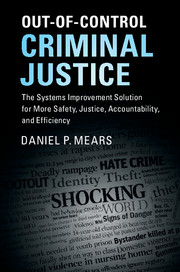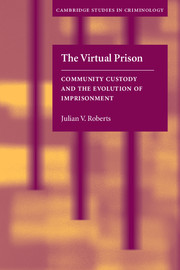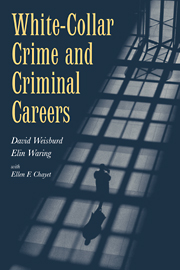Fundamentals of Criminological and Criminal Justice Inquiry
£37.99
- Authors:
- Daniel P. Mears, Florida State University
- Joshua C. Cochran, University of Cincinnati
- Date Published: February 2019
- availability: In stock
- format: Paperback
- isbn: 9781316645130
£
37.99
Paperback
-
How to think about, conduct, and evaluate research is fundamental to the study and understanding of criminology and criminal justice. Students take methods, statistics, theory, and topic-specific classes, but they struggle to integrate what they learn and to see how it fits within the broader field of criminology and criminal justice research. This book directly tackles this problem by helping students to develop a 'researcher sensibility', and demonstrates how the 'nuts and bolts' of criminal justice research - including research design, theory, data, and analysis - are and can be combined. Relying on numerous real-world examples and illustrations, this book reveals how anyone can 'think like a researcher'. It reveals, too, why that ability is critical for being a savvy producer or consumer of criminological and criminal justice research.
Read more- Not merely a 'how to' of research, this book shows students how to analyze, evaluate and use research in their work
- As well as research methods, the book aims to explain exactly when and why certain types of research are carried out and used
- Aimed at practitioners and policymakers, who can learn how to use research to implement effective policy, and researchers who can learn how to develop research ideas that can be useful for practitioners and policymakers
- Includes a succinct history and description of criminology and criminal justice as a field to give context to the history and current state of research in the field, along with examples to give further context
Reviews & endorsements
'Mears and Cochran have hit it out of the park again. This is more than a book on how to follow a research design. The authors thoroughly review the reasons why a research design matters and how to go about implementing one. Certain to have broad appeal, every criminologist will benefit from a careful reading of this book.' Scott H. Decker, Arizona State University
See more reviews'Professors Mears and Cochran have produced a personable, engaging, and insightful book on what is often a really challenging area of study for students. Their anecdotes and myth-busting throughout meant that I managed to read it from cover to cover within a few days. This quite simply is an outstanding methods textbook - I cannot recommend it highly enough.' Kerry Clamp, University of Nottingham
'Mears and Cochran provide an invaluable service to criminology and criminal justice by describing how students can go from passive consumers to active producers of knowledge. This book is flexible in that it can be used in both undergraduate and graduate classrooms, and for scholars or practitioners. This well-written book is a must-read for any student of crime or justice.' Scott Wolfe, Michigan State University
'Criminal justice is increasingly evidence-based, and students need to learn to integrate theory and high-quality methods to tackle policy-relevant dilemmas in the field. Mears and Cochran's Fundamentals of Criminological and Criminal Justice Inquiry is an outstanding guidebook for navigating these challenges. The book would be especially valuable in research methods-oriented upper-level undergraduate courses and beginning graduate courses in criminology and criminal justice.' Jeffery T. Ulmer, Pennsylvania State University
'Good research requires a delicate balance between art and science. But how to achieve this balance? In accessible language and using real-world examples, Mears and Cochran tell us, explaining the nuts-and-bolts of the research enterprise. Along the way, readers develop a 'researcher sensibility' to think more critically - and creatively - about research.' Charis E. Kubrin, University of California, Irvine
'In the tradition of Becker and Mills, Mears and Cochran have written a modern classic on how to think about and how to do research in crime and justice. Accessible, inspirational, and policy- relevant, Fundamentals of Criminological and Criminal Justice Inquiry is our field's definitive guide to research.' Brandon C. Welsh, Director of the Cambridge-Somerville Youth Study, Northeastern University, Massachusetts
'A key feature of modern criminal justice is the use of data and scientific research evidence to enhance strategic decision-making. Mears and Cochran do the field a service by explaining clearly how scientific research can inform and improve criminal justice policy and practice.' Ed Maguire, Arizona State University
'… an engaging and important contribution to an increasingly crowded field in criminological and criminal justice (CCJ) research.' Lorana Bartels, Economic Record
Customer reviews
Not yet reviewed
Be the first to review
Review was not posted due to profanity
×Product details
- Date Published: February 2019
- format: Paperback
- isbn: 9781316645130
- length: 366 pages
- dimensions: 253 x 178 x 17 mm
- weight: 0.79kg
- contains: 16 b/w illus. 7 tables
- availability: In stock
Table of Contents
About the authors
Preface
Part I. Criminological and Criminal Justice Research:
1. Introduction
2. Science and criminological and criminal justice research
3. The science and art of conducting, evaluating, and using research: initial observations
Part II. Essential Research Ingredients: Theory, Data, and Analysis:
4. The role of theory in research
5. The role of data in research
6. The role of analysis in research
Part III. Types of Criminological and Criminal Justice Research:
7. Basic (science-focused) vs. applied (policy-focused) research
8. Identifying causal effects
9. Criminological and criminal justice research areas and topics
Part IV. Chefs in the Kitchen:
10. Criteria for conducting, evaluating, and using research
11. The science and art of conducting, evaluating, and using research: practical steps
References
Index.
Sorry, this resource is locked
Please register or sign in to request access. If you are having problems accessing these resources please email [email protected]
Register Sign in» Proceed
You are now leaving the Cambridge University Press website. Your eBook purchase and download will be completed by our partner www.ebooks.com. Please see the permission section of the www.ebooks.com catalogue page for details of the print & copy limits on our eBooks.
Continue ×Are you sure you want to delete your account?
This cannot be undone.
Thank you for your feedback which will help us improve our service.
If you requested a response, we will make sure to get back to you shortly.
×
